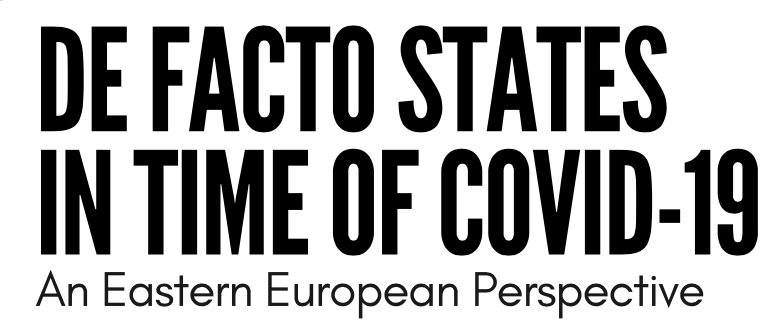De Facto States In Time of Covid-19
Summary:
This report explores human security issues and geopolitical scenarios that unfolded, and stemmed from, the Covid-19 outbreak in Eastern Europe. It sheds particular light on de facto republics and breakaway entities in Southeast Ukraine, Moldova, Azerbaijan and Georgia. This regional perspective offers three relevant lessons for better understanding the impact of Covid-19 crisis on Eastern Europe’s peripheral areas.
First, authorities of de facto entities have benefitted from the state of emergency by tacking a deeper and stricter control over disputed territories and their populations through safety measures and peculiar mechanisms of control. Second, executive tendencies of States dealing with de facto entities from within their de jure national territory, have not guaranteed protection of human rights and respected the rule of law accordingly. Third, certain segments of societies, which were previously exposed to violence and exploitation, have been hit by military confrontations. This threefold scenario continues to worsen tense atmospheres in those disputed territories, in which conflicts have not been yet settled.
This report proceeds as follows. After a short introduction on debunking the discourse of Covid-19 as “the great equaliser“ discourse”, the first analysis explores the tense relations between Ukraine and the self-proclaimed People’s Republics of Donetsk and Luhansk. The author, Victoria Chumenko, pays particular attention to marginal segments of the occupied territories and the geopolitical implications that have so far led to a backdrop in Southeast Ukraine. In the South Caucasus, Alice Griffon and Lenka Martinkova investigate the cause behind the latest flare-up in July 2020, which occurred far away from the disputed region of Nagorno-Karabakh under the cover of the Covid-19 emergency. Both do not only reflect on the implications of the pandemic on the contested territory, but they also foresee how the Covid-19 crisis will have an impact on Armenian and Azeri national economies. As often happens in Armenia and Azerbaijan, people’s attention is drawn to the historical rivalry in the attempt to hide corruption, malfunctioning of democratic mechanisms and other issues alike. In Georgia, instead, Luca Dilda pointed out how the question of cooperation between Tbilisi and the two de facto states of Abkhazia and South Ossetia has been pertaining yet difficult to be concretely implemented due to the Russian spoiler tactics on a military and informatics ground. Last but not least, Michael Andruch argued that Transnistria is beyond doubt the de facto republics in Eastern Europe, showing the highest number of infected people, on the one hand, and the lowest chances to deal properly with the pandemic, on the other hand. At the same time, Russia continues to spoil the relations between Chisinau and Trisapol, the de facto republic would most probably face the collapse of its economy.
THE REPORT CAN BE DOWNLOADED HERE => final-one.de-facto-states (1)
1477

